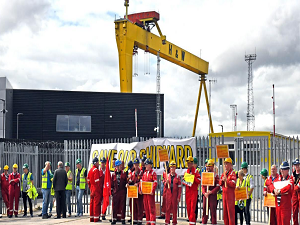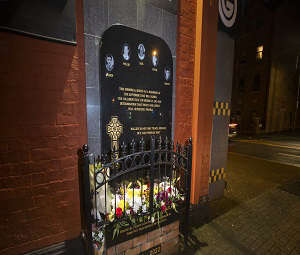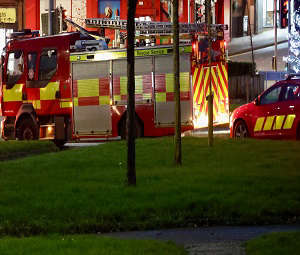
by PA reporter
Several potential bidders have expressed an interest in buying crisis-hit Belfast shipyard Harland and Wolff, its administrators have said.
BDO Northern Ireland said it had agreed to a "temporary" unpaid lay-off of the workforce for a one-week period to enable those potential commercial opportunities to be explored.
The administrators said a small number of the workforce had taken up the option of redundancy.
Harland and Wolff, famed for building the Titanic, went into administration at the start of the week after its troubled Norwegian parent company, Dolphin Drilling, failed to find a buyer.
Fuelled by donations and support from the public, workers have occupied the site round the clock for almost two weeks as part of a high-profile campaign to save the yard.
They have vowed to remain there until a solution is found, pressing government in particular with calls to step in and nationalise the business.
A spokesman for BDO NI said: "In light of insufficient funds to cover the current running costs of the business and in the absence of any other funds being available at this point, in conjunction with unions the administrators have agreed to facilitate an unpaid temporary lay-off until Friday August 16.
"This provides a limited additional time for all parties to pursue any potential opportunity to find a commercial basis to continue the business as a going concern.
"For a small number of workers, the option of redundancy has been provided and taken up.
"A limited core team of workers has also been retained to maintain the site and facilitate the administrators in carrying out their duties.
"A number of interested parties/potential bidders have come forward since our appointment and we are expediently following up on these inquiries in an effort to seek a viable commercial solution.
"This is our focus and we are working closely with interested parties and stakeholders with the aim of securing a positive outcome."
The shipbuilder, whose famous yellow cranes, Samson and Goliath, dominate the Belfast skyline, employed more than 30,000 people during the city's industrial heyday, but the current workforce only numbers around 125.
It has diversified away from shipbuilding in the last two decades and until recently had primarily worked on wind energy and marine engineering projects.
Known around the world for building the doomed White Star liner Titanic, which sank on its maiden transatlantic voyage in 1912 after striking an iceberg, Harland and Wolff was one of the UK's key industrial producers during the Second World War, supplying almost 150 warships.
Workers have called on the Government to step in to rescue the operation, potentially through nationalisation.
But the Government has declined to intervene, insisting the issue is a commercial one.
Officials insist that EU state aid rules limit the scope to offer financial support through public funds.


 Officer to be prosecuted for offence linked to Troubles memorial during pandemic
Officer to be prosecuted for offence linked to Troubles memorial during pandemic
 Pair appear before court charged with nurse’s murder
Pair appear before court charged with nurse’s murder
 Woman dies in West Belfast house fire
Woman dies in West Belfast house fire
 Eleanor Donaldson’s bid to have two charges withdrawn ‘should not delay trial’
Eleanor Donaldson’s bid to have two charges withdrawn ‘should not delay trial’
 Police surveillance operation to unmask journalistic source ruled unlawful
Police surveillance operation to unmask journalistic source ruled unlawful